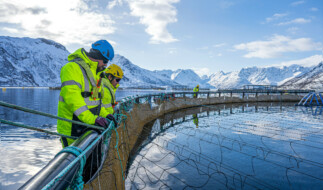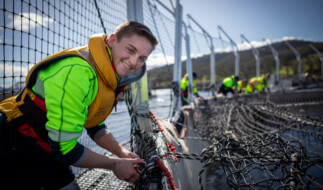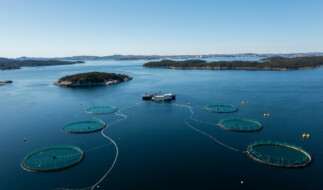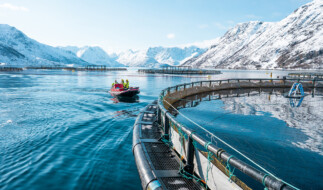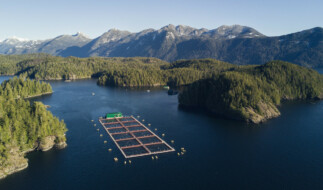RESPONSIBLY FARMED SALMON: A NUTRIENT-RICH FOOD THAT SUPPORTS HEALTHY AND SUSTAINABLE DIETS

Global food systems today are juggling the management of unprecedented challenges with the potential to drive advancements across widescale health, social and environmental progress. Sustainable aquaculture, including responsibly farmed salmon, plays a central role in helping to achieve global dietary and sustainability recommendations. Let’s explore how:
Contributes a nutrient-rich food that meets dietary recommendations
Salmon is widely known as a nutrient-dense food. One serving provides high-quality protein, nearly 2g of omega-3 fatty acids, and essential vitamins like potassium, vitamin D and vitamins B12 and B5. Almost everyone can benefit from making dietary shifts to more nutrient-rich food options, including by eating more seafood. The Dietary Guidelines for Americans (DGA) recommend eating seafood twice a week, and swapping high-fat meats with seafood as a way to help reduce intake of saturated fat and sodium. Choosing seafood like responsibly farmed salmon is one way to make every bite count.

Omega-3 fatty acid (EPA & DHA) comparison by proteins.
Not only is salmon included in the United States’ DGA, it is recognized as a healthy component of food based dietary guidelines around the world. Within these recommendations, some countries are also including sustainability alongside nutrition. An example of this is Denmark, which recommends enjoying farmed or wild seafood every week as part of a healthy and sustainable diet. To learn more about salmon in their latest dietary guidance, read our blog post.
Farmed Salmon and the Sustainable Development Goals
The aquaculture sector, including producers of responsible salmon like GSI members, has an important role to play in achieving many of the United Nations Sustainable Development Goals (SDGs), especially Life Below Water (SDG 14). To heed this call, our members have participated in efforts that span several SDGs, including those focused on eliminating hunger (SDG 2), supporting communities (SDGs 8, 9) and taking climate action (SDGs 12, 13), among others.

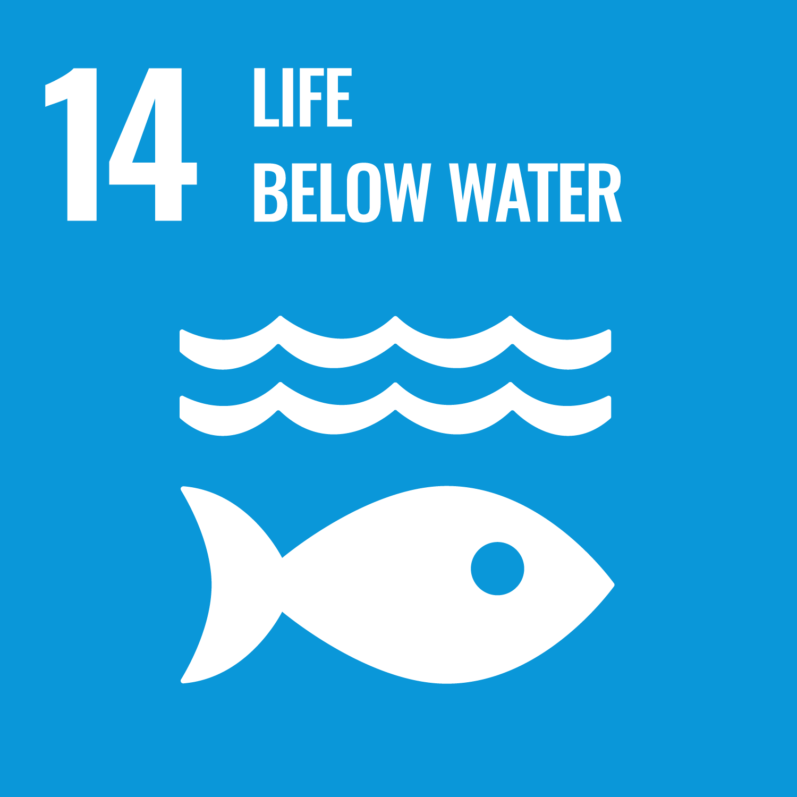
To support SDG 14, Life Below Water, we work to alleviate pressure on marine life and protect marine biodiversity through continuous innovation and knowledge sharing across members to reduce environmental impact. We’ve catalyzed the use of novel feed ingredients, implemented circular economy approaches, enhanced fish welfare and more.

To address SDG 13, Climate Action, we are working with the World Wildlife Fund on a first-of-its-kind climate data reporting framework which will report on performance and support enhanced climate mitigation efforts.
Drives innovations that help support healthier diets and a more resilient global food system
A large reason why salmon is considered sustainable is because of its low carbon footprint. In fact, farmed salmon has the lowest carbon footprint compared to other animal-based protein choices.
But there’s more to farmed salmon’s sustainability story than its footprint. Farmed salmon is also highly eco-efficient in terms of feed conversion ratio and use of fresh water, and the industry continues to identify innovations to further improve resource efficiencies. An example of this is feed, where ingredient innovations – like those led by our members – allow the farmed salmon industry to grow while using less marine-based ingredients like fish oil as part of the recipe.
As global demand for high-quality protein continues to increase, neither land-based agriculture nor wild fish stocks (which are increasingly fished at or above sustainable levels) will be enough to feed the growing global population. This underscores the need for responsible aquaculture to meet global demand.
As the aquaculture industry advances, ongoing innovations in farming practices will ensure aquaculture, and specifically farmed salmon, continue to be a nutritious and sustainable food source.
Seafood is celebrated in cuisines and communities around the world
Of course, food is only healthy if people eat it. Fortunately, people around the world love salmon. In the United States, salmon is the second most popular seafood (just behind shrimp). It has been a staple food in global cuisines for centuries. It’s the backbone of many coastal communities’ economies, cultural identifies and social bonds. From fresh pieces of salmon maki to bagels with lox, salmon has been creatively adapted in iconic dishes around the world for hundreds of years.

Family enjoys eating a variety of salmon sushi.
In addition to being part of global cuisines, aquaculture helps support the economic livelihoods of nearly 20 million people as of 2016. As a network, we employ over 24,000 full-time employees across the supply chain. We also organize educational events, donate resources and host beach clean ups to support the local communities we operate in.
While the aquaculture industry has made great strides since it first began, there is still more to be done to improve the sustainability of farmed salmon. GSI was established by farmed salmon companies that came together with a shared vision of providing a healthy and sustainable source of protein to feed a growing population. Our members are committed to seeking and supporting advancements in aquaculture that drive healthy, sustainable food systems.
